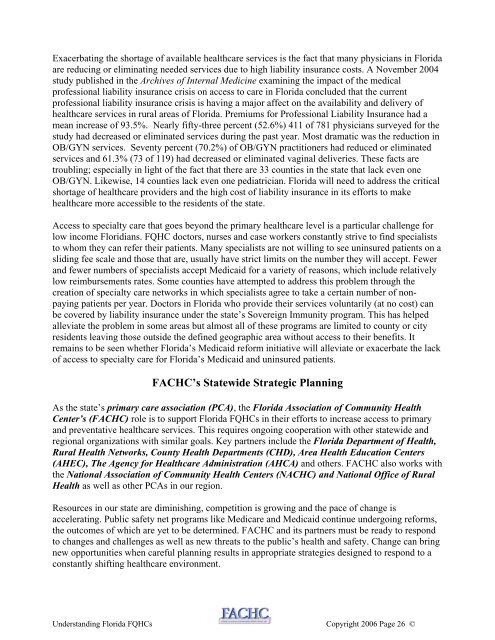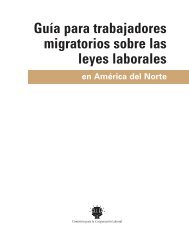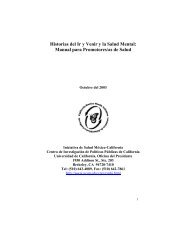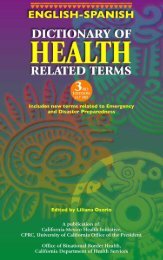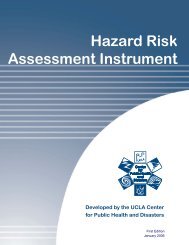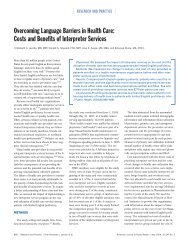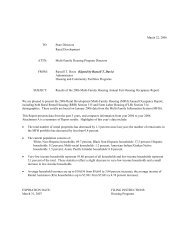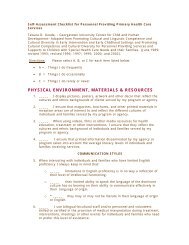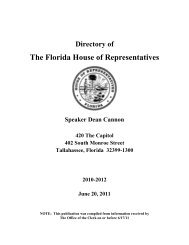Guide to Understanding Florida's FQHCs and 330 Expansion ...
Guide to Understanding Florida's FQHCs and 330 Expansion ...
Guide to Understanding Florida's FQHCs and 330 Expansion ...
You also want an ePaper? Increase the reach of your titles
YUMPU automatically turns print PDFs into web optimized ePapers that Google loves.
Exacerbating the shortage of available healthcare services is the fact that many physicians in Florida<br />
are reducing or eliminating needed services due <strong>to</strong> high liability insurance costs. A November 2004<br />
study published in the Archives of Internal Medicine examining the impact of the medical<br />
professional liability insurance crisis on access <strong>to</strong> care in Florida concluded that the current<br />
professional liability insurance crisis is having a major affect on the availability <strong>and</strong> delivery of<br />
healthcare services in rural areas of Florida. Premiums for Professional Liability Insurance had a<br />
mean increase of 93.5%. Nearly fifty-three percent (52.6%) 411 of 781 physicians surveyed for the<br />
study had decreased or eliminated services during the past year. Most dramatic was the reduction in<br />
OB/GYN services. Seventy percent (70.2%) of OB/GYN practitioners had reduced or eliminated<br />
services <strong>and</strong> 61.3% (73 of 119) had decreased or eliminated vaginal deliveries. These facts are<br />
troubling; especially in light of the fact that there are 33 counties in the state that lack even one<br />
OB/GYN. Likewise, 14 counties lack even one pediatrician. Florida will need <strong>to</strong> address the critical<br />
shortage of healthcare providers <strong>and</strong> the high cost of liability insurance in its efforts <strong>to</strong> make<br />
healthcare more accessible <strong>to</strong> the residents of the state.<br />
Access <strong>to</strong> specialty care that goes beyond the primary healthcare level is a particular challenge for<br />
low income Floridians. FQHC doc<strong>to</strong>rs, nurses <strong>and</strong> case workers constantly strive <strong>to</strong> find specialists<br />
<strong>to</strong> whom they can refer their patients. Many specialists are not willing <strong>to</strong> see uninsured patients on a<br />
sliding fee scale <strong>and</strong> those that are, usually have strict limits on the number they will accept. Fewer<br />
<strong>and</strong> fewer numbers of specialists accept Medicaid for a variety of reasons, which include relatively<br />
low reimbursements rates. Some counties have attempted <strong>to</strong> address this problem through the<br />
creation of specialty care networks in which specialists agree <strong>to</strong> take a certain number of nonpaying<br />
patients per year. Doc<strong>to</strong>rs in Florida who provide their services voluntarily (at no cost) can<br />
be covered by liability insurance under the state’s Sovereign Immunity program. This has helped<br />
alleviate the problem in some areas but almost all of these programs are limited <strong>to</strong> county or city<br />
residents leaving those outside the defined geographic area without access <strong>to</strong> their benefits. It<br />
remains <strong>to</strong> be seen whether Florida’s Medicaid reform initiative will alleviate or exacerbate the lack<br />
of access <strong>to</strong> specialty care for Florida’s Medicaid <strong>and</strong> uninsured patients.<br />
FACHC’s Statewide Strategic Planning<br />
As the state’s primary care association (PCA), the Florida Association of Community Health<br />
Center’s (FACHC) role is <strong>to</strong> support Florida <strong>FQHCs</strong> in their efforts <strong>to</strong> increase access <strong>to</strong> primary<br />
<strong>and</strong> preventative healthcare services. This requires ongoing cooperation with other statewide <strong>and</strong><br />
regional organizations with similar goals. Key partners include the Florida Department of Health,<br />
Rural Health Networks, County Health Departments (CHD), Area Health Education Centers<br />
(AHEC), The Agency for Healthcare Administration (AHCA) <strong>and</strong> others. FACHC also works with<br />
the National Association of Community Health Centers (NACHC) <strong>and</strong> National Office of Rural<br />
Health as well as other PCAs in our region.<br />
Resources in our state are diminishing, competition is growing <strong>and</strong> the pace of change is<br />
accelerating. Public safety net programs like Medicare <strong>and</strong> Medicaid continue undergoing reforms,<br />
the outcomes of which are yet <strong>to</strong> be determined. FACHC <strong>and</strong> its partners must be ready <strong>to</strong> respond<br />
<strong>to</strong> changes <strong>and</strong> challenges as well as new threats <strong>to</strong> the public’s health <strong>and</strong> safety. Change can bring<br />
new opportunities when careful planning results in appropriate strategies designed <strong>to</strong> respond <strong>to</strong> a<br />
constantly shifting healthcare environment.<br />
<strong>Underst<strong>and</strong>ing</strong> Florida <strong>FQHCs</strong> Copyright 2006 Page 26 ©


